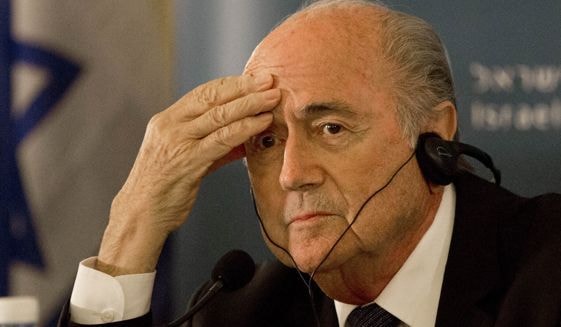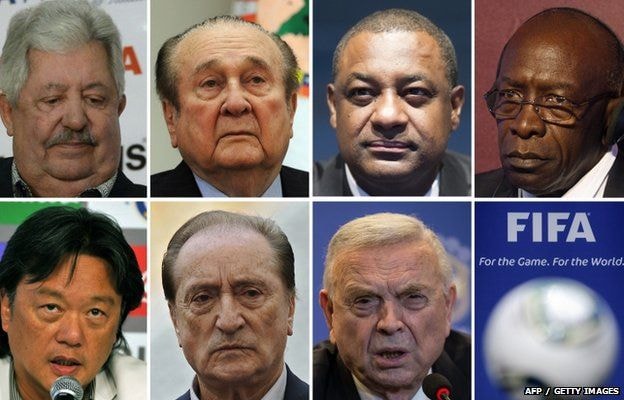FIFA is "twisted" because corruption "pokes holes"!
Seven FIFA officials were arrested in Switzerland on May 27 at the request of US authorities after they were charged with corruption. The amount involved is said to be more than $150 million (£97 million).
 |
| FIFA President Sepp Blatter at a press conference on May 19 |
Hours later, Swiss authorities launched their own criminal investigation into the bidding process for the 2018 and 2022 World Cups. Swiss police raided FIFA headquarters in Zurich and collected electronic evidence.
Why is this event noteworthy?
FIFA is the body responsible for governing world football. In recent years, the body has faced numerous allegations of corruption, most notably the decision to award the 2022 World Cup to Qatar.
In December 2014, FIFA did not publish its own investigation into corruption – claiming that the bidding process was not flawed. The report’s author, American Michael Garcia, has now resigned.
The World Cup is one of the world’s biggest sporting events, generating billions of dollars in revenue. The arrests and investigations raise questions about the transparency and integrity of the process for selecting venues for the last three tournaments.
Two investigations
The US charges – centred on corruption allegations dating back to 1991 – are the most serious, as they could lead to prison sentences. In addition to the seven officials arrested in Zurich, charges have been brought against seven others.
The Swiss criminal case remains under investigation but could provide revelations about the allocation of upcoming World Cup tournaments.
This is the first time that the authorities with the power to prosecute have investigated the bidding process in detail. However, in its statement, Switzerland made it clear that FIFA was in fact the “injured party”. This means that they are investigating individuals who may have misused the bidding process and used it for money laundering purposes.
Who is charged with corruption?
The most senior figures arrested at the request of the US are power brokers in soccer in North America, Latin America and the Caribbean.
 |
| Former and current FIFA leaders accused of corruption include: Rafael Esquivel, Nicolas Leoz, Jeffrey Webb, Jack Warrer, Eduardo Li, Eugenio and Jose Maria Marin. |
They have ties to the Concacaf, which is part of FIFA – essentially the governing body for soccer in the region. One of its key roles is to help with World Cup television and sponsorship deals in the US.
Jeffrey Webb is the head of Concacaf and is widely seen as being groomed to succeed FIFA President Sepp Blatter.
Webb's predecessor, Warner, has also been charged. Webb took over when Warner was forced to resign following a fraud investigation.
Another key figure was Charles "Chuck" Blazer, the former representative of US soccer at FIFA, who is said to have informed the US Federal Bureau of Investigation (FBI).
He pleaded guilty and has now repaid the $1.9 million.
Others arrested were FIFA officials from Central and South Asia.
Has Sepp Blatter been arrested?
Not yet. The FIFA president and most powerful man in soccer has not been named in the US indictments. However, they have stressed that those arrested worked in FIFA departments – the body headed by Mr. Blatter. He has so far made no statement.
Recently, Blatter denied sources saying that he was avoiding traveling to the US for fear of being arrested by the FBI.
Why were these officials arrested?
The FBI has been investigating FIFA for the past three years. The probes were initially sparked by the bidding process for the 2018 World Cup in Russia and 2022 in Qatar, but have since expanded to cover FIFA's dealings over the past 20 years.
The Justice Department's indictment alleges that the corruption was planned in the United States, even if it later took place elsewhere. The use of US banks to move the money was key to the investigation.
How much money is involved in this?
It is believed that these are huge sums of money.
The US indictment believes that more than $150 million was involved in the corruption, and that figure does not include other corruption that may have occurred around the world. A previous FIFA report on corruption in the Caribbean was leaked, saying that $40,000 in bribes were handed to officials in envelopes stuffed with cash.
Most of FIFA's revenue comes from the World Cup, the most lucrative sporting event in the world, surpassing even the Olympics.
Last year’s tournament cost host Brazil an estimated $4 billion, but FIFA still made a profit of more than $2 billion. The costs of the next two World Cups could far exceed that figure: Qatar is expected to spend more than $6 billion.
Bidding for the World Cup itself is expensive – the Football Association spent £21 million on England’s unsuccessful bid to host the 2018 tournament.
Will the 2018 Russia and 2022 Qatar World Cups be changed?
Unlikely but not impossible at this point.
The US indictments focus on past corruption – the selection of South Africa as host of the 2010 World Cup is also mentioned – rather than upcoming World Cups.
Swiss investigations into these tournaments have proven more effective, but overwhelming evidence is needed to re-run the bidding process.
In reality, changing the 2018 World Cup in Russia would be difficult. Very few countries have the stadiums, infrastructure or finances to host the event on such short notice.
Even most of England's stadiums would need extensive refurbishment to meet FIFA standards. Germany is the best option, having hosted the 2006 World Cup.
Qatar is even more vulnerable and has faced controversy and corruption allegations since it was awarded the 2022 World Cup.
However, hit by several corruption scandals, an unprecedented move from a summer tournament to a winter one and a scandal over the treatment of migrant workers working on World Cup construction sites, it is a wonder the country will somehow retain the world's most prestigious tournament.
Will Sepp Blatter still win the FIFA presidency for a fifth term?
The election is set for May 29 and he was widely expected to win, but recent developments could change that.
Mr Blatter has the support of Africa and Asia – two large voting blocs needed to win the election.
The question is whether, in the next few dozen hours, people will be tempted to turn to support his only opponent, Jordanian Prince Ali bin al-Hussein.
Intense lobbying is underway among the 209 member associations. European nations are desperate for a change in FIFA leadership, but it remains to be seen whether they can convince the rest of the world.
| RELATED NEWS |
|---|
Thu Giang
(Synthesized from BBC)






